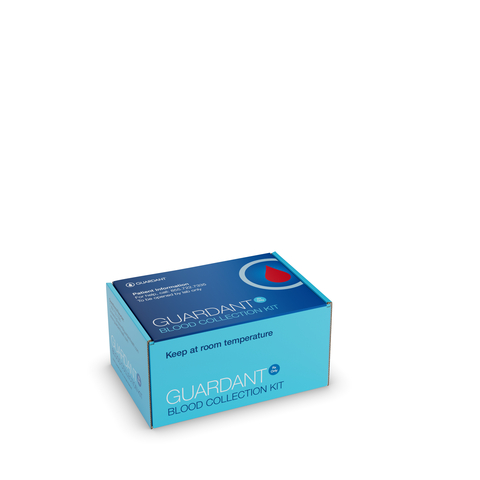Guardant Health Announces Shield™ Blood Test Available in US to Detect Early Signs of Colorectal Cancer in Average-Risk Adults
Guardant Health has launched Shield, a blood-based test aimed at early-stage colorectal cancer (CRC) detection, targeting adults aged 45 and older who are not current with screening guidelines. The test boasts a sensitivity of 91% for CRC and 20% for advanced adenomas with a specificity of 92%. This innovative screening method addresses compliance barriers associated with traditional methods like colonoscopy, offering a simple blood draw with no preparation required. Shield is now available by prescription through healthcare providers.
- Launch of Shield test for early-stage CRC detection, aiming to improve screening rates.
- High sensitivity rates: 91% for CRC and 20% for advanced adenomas.
- Convenient blood draw method, overcoming compliance barriers associated with traditional tests.
- Sensitivity for advanced adenomas is relatively low at 20%.
- The test is not a replacement for current CRC screening methods and requires follow-up if results are abnormal.
- Highly sensitive Shield test offers convenient screening method that can be completed with simple blood draw, helping overcome barriers to compliance
-
Test demonstrated sensitivity of
91% in colorectal cancer and20% in advanced adenoma detection with specificity of92% in validation studies

Colorectal cancer is the second-leading cause of cancer-related deaths in the
The clinical performance of the Shield assay was validated using a set of 309 patient samples, including 92 with CRC, 51 with advanced adenomas and 166 normal cases. CRC patient samples were accrued across six unique cohorts collected in the
“The availability of the Shield test represents a major milestone in our commitment to transform cancer screening. We have developed highly sensitive technology to detect early-stage cancers with a simple blood draw,” said AmirAli Talasaz,
Why CRC screening compliance matters
More than
“The value of colorectal cancer screening is well-established for individuals at average risk, age 45 and older,” said
“Colorectal cancer is largely preventable if caught early, yet barriers to screening tests remain. It can be especially challenging for underserved populations to get screened. These barriers include lack of healthcare access, limited capacity in healthcare systems, transportation challenges, childcare, and lack of paid leave from work,” said
How the Shield assay was developed
The Shield test detects early signs of CRC signals in the bloodstream. The assay was developed using multiple cohorts comprising 2,089 subjects with CRC, 357 with advanced adenoma and 3,757 normal subjects. The samples were collected within both prospective screening collections designed to capture the intended use population and retrospective case-control cohorts designed to enrich for subjects with CRC.
Where the Shield test is available currently
Shield is now available for eligible individuals by prescription only through healthcare professionals. This LDT (Laboratory Developed Test) is intended to be complementary to, and not a replacement for, current recommended CRC screening methods. A negative result does not rule out the presence of cancer. Patients with an abnormal blood-based screening result should be referred for a diagnostic colonoscopic evaluation.
What’s next for the Shield test
This year
More information about the Shield test is available at bloodbasedscreening.com.
About
Forward-Looking Statements
This press release contains forward-looking statements within the meaning of federal securities laws, including statements regarding the potential utilities, values, benefits and advantages of Guardant Health’s liquid biopsy tests or assays, which involve risks and uncertainties that could cause the actual results to differ materially from the anticipated results and expectations expressed in these forward-looking statements. These statements are based on current expectations, forecasts and assumptions, and actual outcomes and results could differ materially from these statements due to a number of factors. These and additional risks and uncertainties that could affect Guardant Health’s financial and operating results and cause actual results to differ materially from those indicated by the forward-looking statements made in this press release include those discussed under the captions “Risk Factors” and “Management’s Discussion and Analysis of Financial Condition and Results of Operation” and elsewhere in its Annual Report on Form 10-K for the year ended
References
-
American Society of Clinical Oncology . Colorectal cancer: statistics. Cancer.net website. UpdatedFebruary 2022 . AccessedMarch 22, 2022 . https://www.cancer.net/cancer-types/colorectal-cancer/statistics. -
Adler A, Geiger S, Keil A, et al. Improving compliance to colorectal cancer screening using blood and stool based tests in patients refusing screening colonoscopy in
Germany . BMC Gastroenterol. 2014;14:183. doi:10.1186/1471-230X-14-183. - Rich T, Raymond V, Lang K. Where are we today? Efforts to understand strategies and barriers to physician issuance of a recommendation for colorectal cancer screening: a systematic review. Gastroenterology. 2020;158(6 suppl 1):S-918. doi:10.1016/S0016-5085(20)32981-4.
-
Doubeni CA,
Fedewa SA , Levin TR, et al. Modifiable failures in the colorectal cancer screening process and their association with risk of death. Gastroenterology. 2019;156(1):63-74. doi:10.1053/j.gastro.2018.09.040. -
American Cancer Society . https://www.cancer.org/content/dam/cancer-org/research/cancer-facts-and-statistics/colorectal-cancer-facts-and-figures/colorectal-cancer-facts-and-figures-2020-2022.pdf. Accessed onlineFebruary 4, 2022 .
View source version on businesswire.com: https://www.businesswire.com/news/home/20220502005342/en/
Investor Contact:
investors@guardanthealth.com
+1 657- 254-5417
Media Contact:
press@guardanthealth.com
+1 215-910-2138
Source:
FAQ
What is the Shield test by Guardant Health?
What are the sensitivity and specificity of the Shield test?
Who is eligible for the Shield test?
How does the Shield test improve CRC screening compliance?







